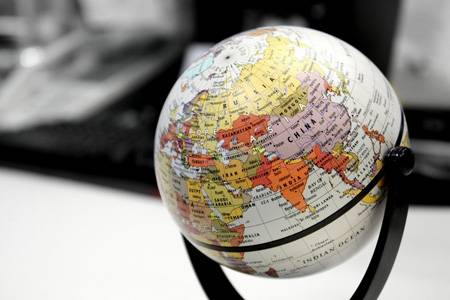Weeks before launching a military offensive in support of his besieged ally in Syria, Russia’s powerful President Vladimir Putin made a telling remark “We have more aces up our sleeves that would push our Western colleagues and partners towards a more constructive dialogue.”
The timing of Putin’s calculated gamble in Syria’s protracted civil war, now being played out by a myriad of state and non state actors, has resulted in a near absolute control of the Syrian air space, protection of vital Russian strategic interests, i.e. its naval facility in Tartus, confronting the challenge of radical Islamists in IS dominated areas before they reach the Russian heartland and delivering a stern message to his detractors.
Contrast this with Pakistan’s most recent position on Syria of opposing the use of force and respecting Syrian territorial integrity. Our final policy on Syria, years after the onset of that country’s civil war only carries symbolic value for President Assad and not Syrians. A President, who even his powerful allies agree, must leave. Pakistan’s position would further strain our frayed relations with traditional Arab friends and the West. Such uncertainty, lack of clarity has characterized Pakistan’s foreign policy calendar 2015 exclusive of two exceptions in my view. The civil military imbalance has also weighed heavily on most of our foreign policy decisions. Let us examine a few core foreign policy areas and how should they be managed in the year ahead:
Whether we may like to admit or not, Pakistan has already ceded much of its influence in Afghanistan to India. After an optimistic start with President Ghani, our failure to bring Taliban to the negotiating table, the Kunduz and now Helamand offensives of the later, the successful scuttling of the Murree round by NDS (the Afghan Intelligence Agency) and it’s Indian backers in the disclosure of Mullah Omar’s death and Taliban infighting have left us in a deeply troubling situation. This has also left a partner in President Ghani to resort to the similar fixture of playing India against Pakistan. He has little to show his raucous critics the benefits of his Pakistan policy, that too at a time when men like the Afghan Chief Executive Abdullah Abdullah are standing by to unseat him. An end to Taliban infighting and re starting negotiations in the safer shores of Doha or inconspicuous Urumqi would lend some credence to both President Ghani and Pakistan.
Pakistan’s disastrous assessment to refrain from the Yemen conflict would not only have far reaching consequences with its vital relationships in the Middle East and Saudi Arabia in particular but has already hurt our short term interests in increased linkages and support to India from the Gulf, the UAE in particular. It is pertinent to mention that by refusing to support the Gulf coalition in Yemen, we have also lost an opportunity to come closer to countries such as Egypt which is an essential member of the coalition and a country with which we have had a customary relationship. Egyptian support for the coalition has translated into billions of dollars for a cash strapped Egyptian economy, the purchase of frigates for the Egyptian navy paid for by the Gulf and a recent announcement of a further 30 billion Saudi Riyals, all this at a time when the prices of oil, the chief Gulf export are at near to the ground.
A lack of convergence on key strategic matters, mistrust and an influential Indian lobby on Capitol Hill continued to bedevil relations with Pakistan. The Obama administration’s overtures to India including setting up of a special India procurement cell at the Pentagon, American support to India for a permanent seat at the UN Security Council and membership of NSG and its policy to de hyphenate India and Pakistan in its South Asian calculus have had a negative fallout on Pak-US relations. The debate on Pakistan’s stockpiling of tactical nuclear weapons would further exacerbate a troubled relationship.
The most notable attainment of Pakistan’s Foreign Policy 2015 has been re starting of the comprehensive bilateral dialogue with India. This has more to do with the chagrin that the current Indian leadership has caused for their country rather than any vindication of Pakistan’s stated policies. However, it is to Pakistan’s credit that it has been able to bring a hostile country, with a much larger size and international clout to the negotiating table. Outside powers such as Britain and the US may have a played a key role as have the resolute defeat of India’s ruling party in a crucial state like Bihar and lastly the relationship between the Pentagon and GHQ which in independent of US-Pak bilateral relationship but one must be cautiously optimistic over this resumption.
The re emergence of Russia as an important player in Eurasia and to an extent globally and Pakistan’s renewed engagement with that country has been a second foreign policy success. The signing of a Russia- Pakistan Defense Cooperation agreement, the procurement of Mi-Hind helicopters, a possible up gradation of JF-17 thunder aircrafts with Russian engines, the North South gas pipeline and formation of working groups in five core areas at the recently concluded Inter Governmental dialogue in Islamabad have certainly brightened prospects for a better bilateral relationship. However, Pakistan’s reliance on International Financial Institutions, a fragile economic recovery and Russia’s long standing strategic partnership with India would continue to be major factors in our ties with that country. It is hoped that with the current appointment of a seasoned Russian speaking and specialist Ambassador to Moscow, Qazi Khalilullah, would be able to elevate this relationship to a more stable and higher trajectory. –
The writer was a career diplomat who retired as Pakistan’s Ambassador to Serbia.






